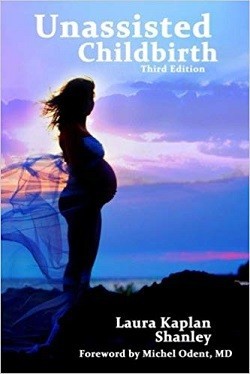Complete list of book reviews on the AIMS website
To read or download this Journal in a magazine format on ISSUU, please click here
AIMS Journal, 2019, Vol 30, No 4
A book review by Gemma McKenzie
|
Third edition, published 2016 ISBN 978-1-49915-203-6 185 pages |
 |
This is a book about the much maligned and often misunderstood world of unassisted childbirth. An unassisted birth (or freebirth) occurs when a woman intentionally gives birth out of the presence of health care professionals. This is usually at home with those close to her, such as her partner, friends or family. A book on this subject therefore looks at pregnancy and birth in an unconventional way - as a non-pathological and natural female physiological process. However, its content remains important to those working to improve the maternity system, as it challenges accepted norms and provides an alternative perspective on how some women prefer to approach birth.
The book is not a ‘DIY delivery’ type of book, nor does Shanley advocate unassisted birth. It is also not an academic hard read. Instead, it is an explanation of an alternative way of birthing, and an account of Shanley’s own spiritual and birthing journeys.
Shanley begins with exploring the ease with which animals and ‘tribal women’ give birth, highlighting anthropological accounts of how women in other societies appear to have experienced few complications. She also highlights the role of intuition and the reliance of internal authority, arguing that Western women have become reliant on external authority to tell them how to behave and are therefore quick to dismiss their inner selves. In contrast, the current practice of highly medicalised birth is condemned, and Shanley gives a bleak outlook with regards to maternal and infant outcomes relating to the use of medical interventions.
Throughout the book, there are some insightful snippets of wisdom for both pregnant women and those working within the maternity system. For example, Shanley argues that “the insistence on pushing in labour is simply a reflection of our cultural attitude that force and haste are superior to trust and patience” (p.25). There is also an interesting discussion on pain, in particular that birth can be pain free if women approach it without fear and let go of the negative messages around birth that society often bombards us with. While I’m not entirely convinced of this argument (for example, I think some pain may be the body’s way of telling the mother to be that the birth is imminent), I do think that there is some truth in what Shanley is saying. In particular, it is interesting to consider whether childbirth is more painful if women are filled with fear and anxiety, and it is certainly arguable that a woman’s state of mind may play a role in how complicated or protracted her birth becomes.
The book has frequent religious (Christian) undertones, which may be great for some readers, but was not really to my taste. Some sections of text also seemed a bit far-fetched for me (for example that people could regrow their teeth using the power of their minds). Having said that, there is a lot of positive energy in the book, and some truly magical birthing stories. My favourite chapter was Shanley’s own account of her life. Written with humour and honesty, it took the reader from her middle-class Jewish childhood through to her rather unconventional early adult life via spiritual texts, unassisted childbirth and topless dancing.
While not written specifically for a British audience, the book does provide an alternative way of thinking about birth, and I would recommend it to women interested not necessarily just in freebirth, but also to those who want to try and make their births as natural as possible. Equally, for those engaged in the maternity services, the book provides an opportunity to challenge one’s own understanding of birth, and serves as a discussion point for ways in which the maternity system can be improved to better support women’s needs.
Gemma McKenzie is an AIMS volunteer and is currently undertaking doctoral research at King’s College, London on women’s experiences of freebirth.
The AIMS Journal spearheads discussions about change and development in the maternity services..
AIMS Journal articles on the website go back to 1960, offering an important historical record of maternity issues over the past 60 years. Please check the date of the article because the situation that it discusses may have changed since it was published. We are also very aware that the language used in many articles may not be the language that AIMS would use today.
To contact the editors, please email: journal@aims.org.uk
We make the AIMS Journal freely available so that as many people as possible can benefit from the articles. If you found this article interesting please consider supporting us by becoming an AIMS member or making a donation. We are a small charity that accepts no commercial sponsorship, in order to preserve our reputation for providing impartial, evidence-based information.
AIMS supports all maternity service users to navigate the system as it exists, and campaigns for a system which truly meets the needs of all.